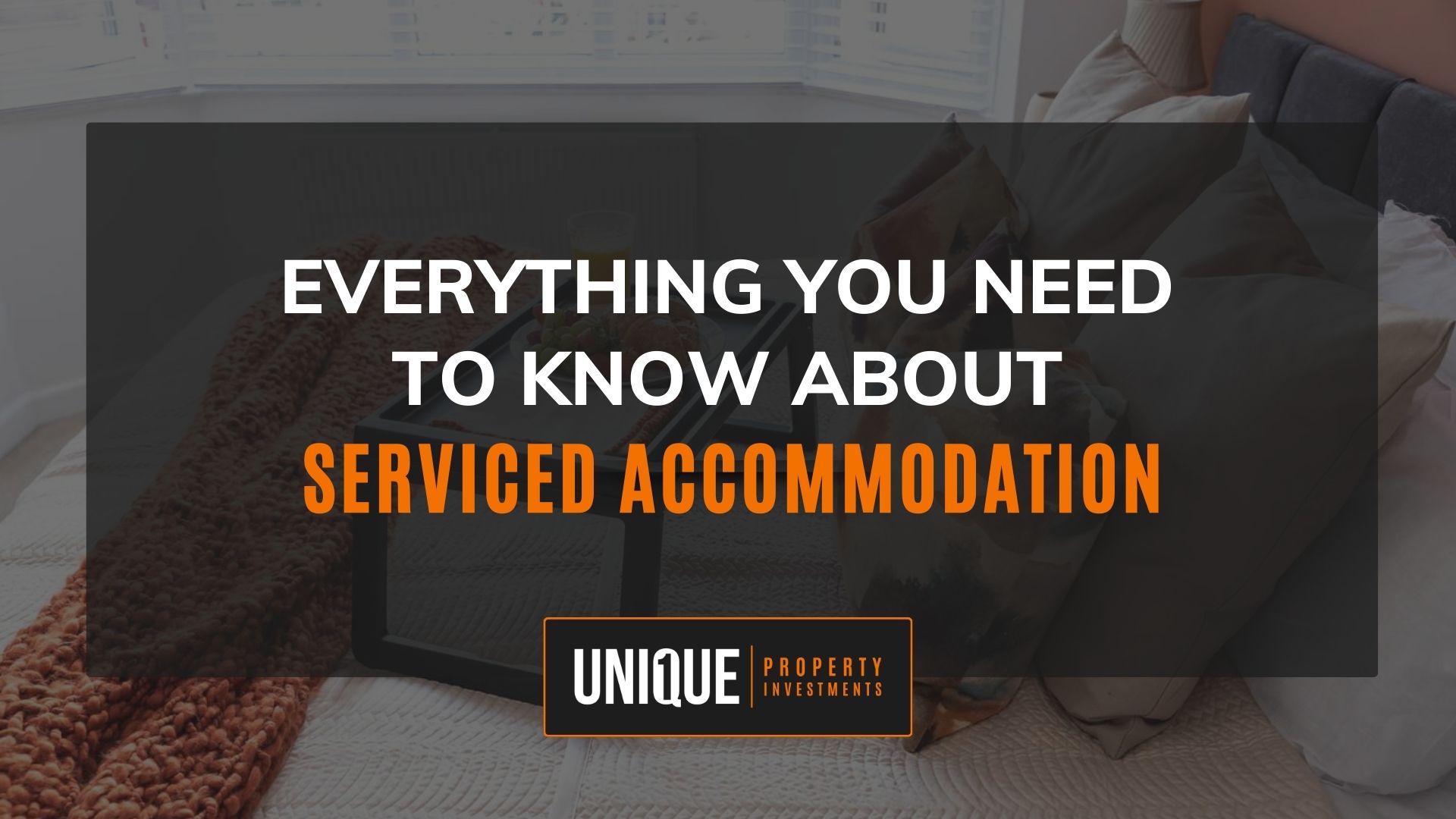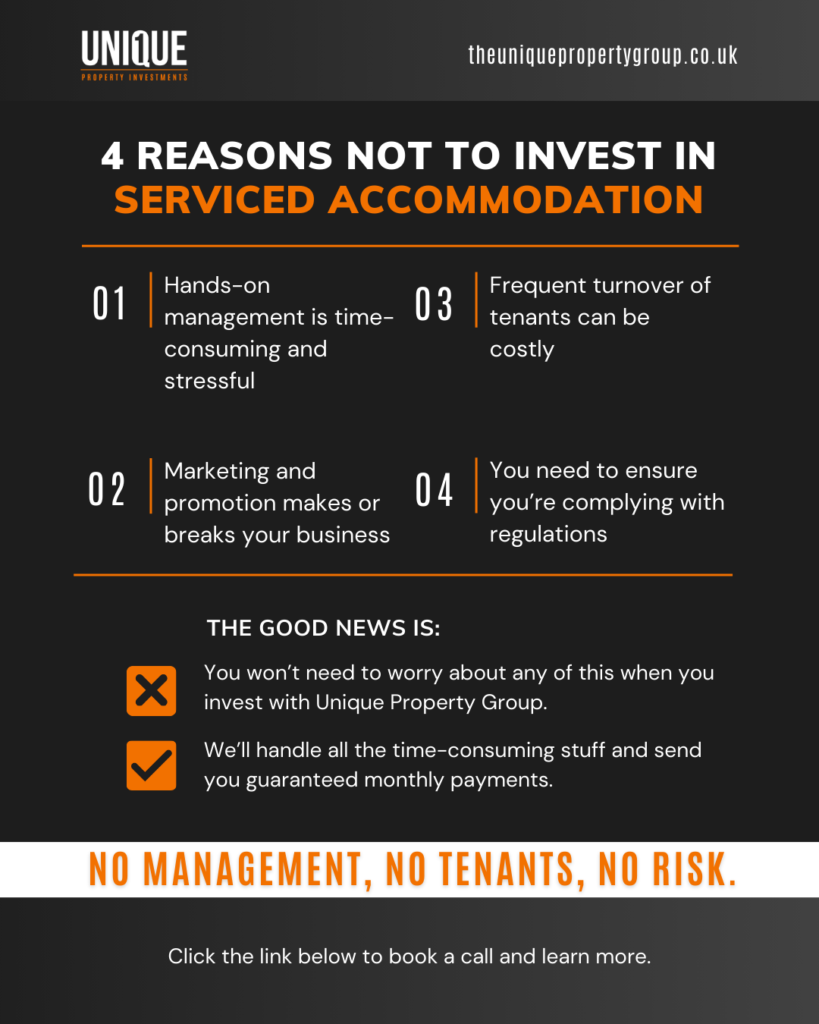This post will walk you through everything you need to know about investing in serviced accommodation.
Serviced accommodation is a great way to start investing in property without needing a huge capital injection…
But it’s only a good investment if you know what you’re doing.
Without the right knowledge – serviced accommodation is a great way to lose money and be constantly stressed.
We don’t want you going through that…
That’s why you’ll learn everything you need to know about serviced accommodation by the end of this post.
Table of Contents
What is serviced accommodation?
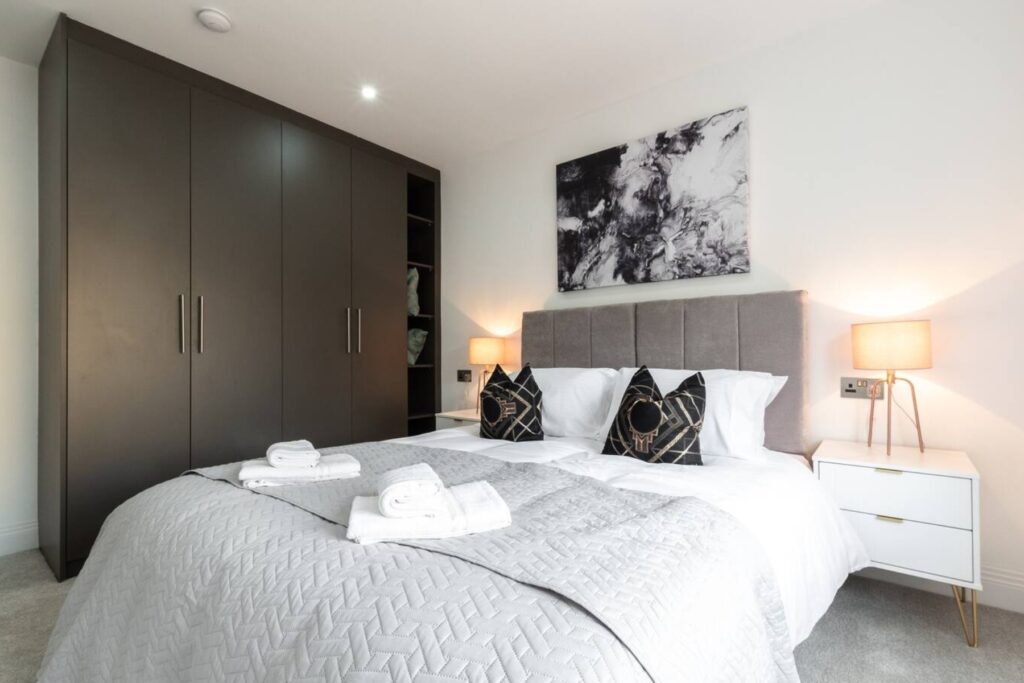
Serviced accommodation is where landlords let out residential properties on a short-term basis with a range of amenities included. Think of it as a hybrid between a hotel and a long-term rental property.
Serviced accommodation comes fully furnished – making it an ideal choice for guests looking for both comfort and convenience. Serviced accommodation gives guests the space and privacy of a home with the luxury of hotel-like services.
Here’s what you can typically expect from serviced accommodation:
- Fully equipped kitchen – no need to eat out every night, guests can cook their own meals
- Weekly or bi-weekly cleaning service – guests don’t have to worry about tidying up after themselves
- All-inclusive utilities and WiFi – no additional costs for the guest, making budgeting easier
- 24/7 concierge service – guests have access to assistance at any time of day or night for any needs or concerns they might have during their stay
- Flexible length of stay – serviced accommodation offers short-term stays, perfect for business travellers, tourists, or anyone needing temporary housing
Demand for serviced accommodation keeps rising because of its flexibility and convenience. It offers a more comfortable and affordable alternative to hotels, especially for longer stays - Security and privacy – a private property with controlled access, surveillance, an on-site concierge and secure key systems makes guests feel secure and safe.
What is a serviced apartment?
Serviced accommodation and serviced apartments are similar – but they have small differences.
Here’s what a serviced apartment is – in a nutshell:
- A serviced apartment is a fully furnished apartment available for both short-term and long-term stays
- It provides the services of a hotel but with added space, convenience and privacy like your own home
- Guests get their own kitchen, living room, and separate bedrooms
- Serviced apartments are usually geared towards stays of a month or longer, but depending on local laws and regulations, shorter stays of a week or more may be allowed
Here’s the difference between serviced apartments and serviced accommodation:
- Serviced accommodation is a broad term that includes any type of furnished accommodation that’s available for short or long-term stay and comes with cleaning services
- This includes serviced apartments, but it also includes other types of properties like cottages, villas, or even castles!
- Just like in a serviced apartment – guests in serviced accommodation need to check-in and check-out like they would in a hotel
The short version is:
All serviced apartments fall under the umbrella of serviced accommodation – but, not all serviced accommodations are serviced apartments.
What does serviced accommodation mean?
Serviced accommodation is accommodation…with services provided.
Obvious – I know.
The landlord provides ‘services’ to guests staying in the accommodation.
These services range from housekeeping and WiFi to 24/7 surveillance and concierge.
Some purpose-built serviced apartment blocks come with in-house gyms, restaurants, shops, and more.
Serviced accommodation isn’t always an apartment in a block – it can be any type of residential property with additional services provided, available for short-term to long-term stays.
Examples of Serviced Accommodation:
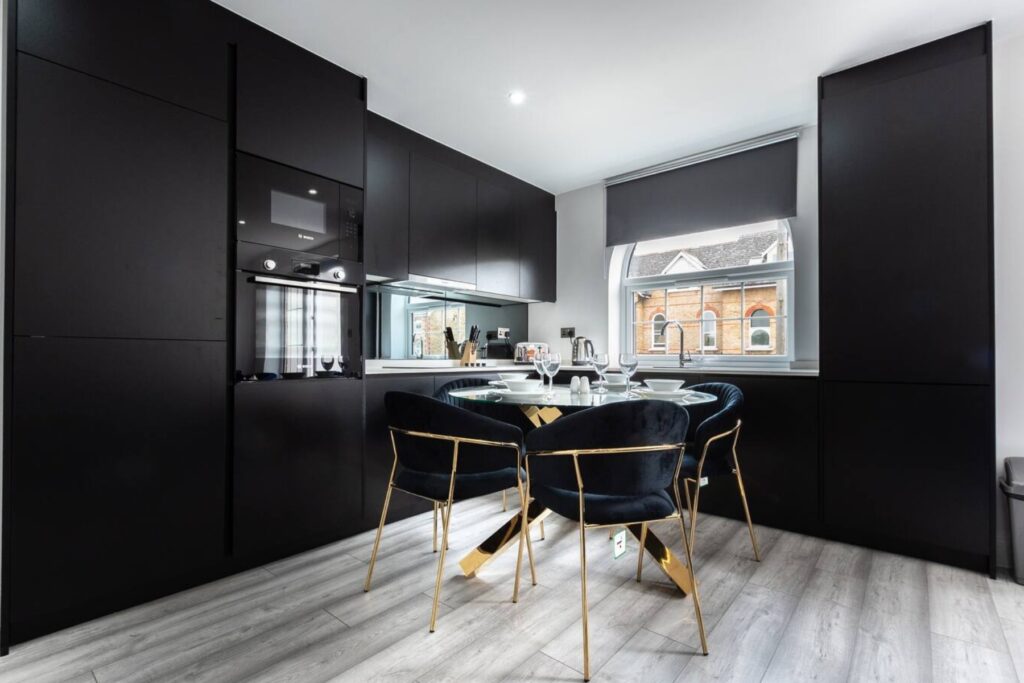
- Residential Serviced Accommodation: These are fully furnished apartments or houses that come with all the bells and whistles – separate living, dining, and sleeping areas, kitchen facilities with appliances and cooking utensils. They also include housekeeping services and 24-hour concierge.
It’s like having your own home, but without the maintenance hassles. - Serviced Corporate Lets: These are ideal for business travellers – they’re often located in city centres or business districts. They offer the same amenities as residential serviced accommodation – but with added perks tailored for corporate guests.
This can include things like a dedicated workspace or conference facilities. - Serviced Hotel-style Apartments: Think of these as a hybrid between a hotel and an apartment. You get the space and flexibility of an apartment – but with the service level and amenities of a hotel – reception services, transportation, tourist information and more.
What are the benefits of investing in serviced accommodation?
- Steady Cash Flow: Unlike traditional buy-to-let properties – serviced accommodation can offer a higher rental yield. Why? Because you’re renting out on a short-term basis at a higher rate.
- Flexibility: Serviced accommodation is all about adaptability. You can cater to holidaymakers in the summer and business travellers in the winter. The serviced accommodation market is vast and varied.
- Hands-off Investment: When you invest with Unique Property Investments Group – we’ll take care of everything – from marketing to maintenance.
And, that’s not all:
Our serviced accommodation model gives you guaranteed monthly income with a fixed-term ROI on your investment.
What are the downsides of investing in serviced accommodation?
Investing in serviced accommodation can be a lucrative move but doing it all yourself can be a huge hassle.
For example, you’ll need to deal with:
- Hands-on Management: From handling bookings to dealing with customer complaints and maintenance issues – it’s all on your shoulders. It can be time-consuming and stressful, especially if you have other commitments.
- Frequent Turnover of Tenants: Serviced accommodations often attract short-term renters which means a higher turnover. This can result in more wear and tear, leading to frequent maintenance and repairs.
- Marketing and Promotion: Getting people to know about your property can be tough without the right expertise. You’ll need to compete with other accommodations in your area and stand out from the crowd.
- Regulatory Compliance: Navigating the legal landscape of short-term rentals can be tricky. You’ll need to ensure you’re compliant with local laws and regulations, which can change at any time.
You can avoid the hassle of these downsides when you invest in serviced accommodation with Unique Property Investments Group.
Click here to learn more about our serviced accommodation investment opportunity.
What should serviced accommodation include?
These are the essentials included in serviced accommodation:
- Fully Furnished Rooms: Your guests expect a home away from home. That means a fully furnished space with a comfortable bed, a cozy living area, and a functional kitchen.
- Regular Cleaning Services: Nobody wants to scrub floors on their holiday. Nobody wants to clean up while they’re away from home. Regular housekeeping services are a must.
- 24/7 Customer Service: Problems don’t keep office hours. A 24/7 customer service line means guests can get solutions to their problems whenever they need.
- High-Speed Internet: In this digital age, high-speed internet isn’t a luxury – it’s a necessity.
- Security Measures: Effective security measures like CCTV, secure locks, and a 24/7 concierge give your guests peace of mind.
What type of guests stay in serviced accommodation?
Serviced accommodation attracts a variety of guests, here are a few examples:
- Business Travelers: These are the movers and shakers, the jet-setters who mix business with pleasure. They’re looking for a place that feels like home that also doubles as a workspace.
- Tourists: These guys are out to explore, experience, and enjoy. They want a comfy base to return to after a day of sightseeing. A place that offers more than just a bed – they want homely comforts and a kitchen to cook up a storm.
- Relocating Families: Uprooting and moving is a big deal. These families need a temporary home during their transition. A space where they can relax, regroup, and plan their next move.
- Contract Workers: Here today, gone tomorrow. These short-term workers need flexible accommodation without the hassle of long-term leases. They want a stress-free stay with all their necessities taken care of.
Why are serviced apartments becoming more popular with guests?
Serviced accommodation is a great opportunity for landlords and investors – and it offers many benefits to guests too.
Here are a few examples:
- Cost-Effective: For long stays, serviced apartments often work out cheaper than hotels. Guests can also cook their own meals and save money on dining out.
- More Space: Typically, serviced apartments offer about 30% more space than a hotel room. That’s extra room for guests to spread out and feel at home.
- Hotel-Like Comforts: Just because it’s not a hotel doesn’t mean guests lose the hotel perks. Serviced apartments offer hotel-like comforts, but with the added bonus of a homely feel.
- Privacy: Serviced apartments are designed to give their guests privacy. They usually have separate access and cooking facilities, reducing unnecessary contact with others.
What is the difference between a serviced and a non-serviced apartment?
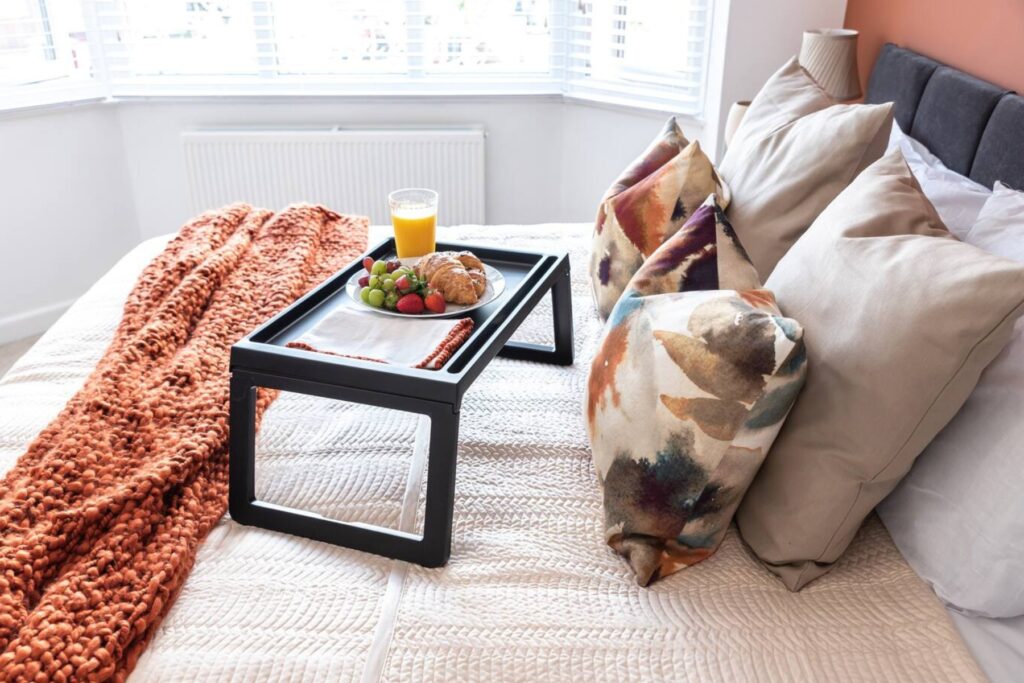
Here are the major differences between serviced apartments and non-serviced apartments:
With serviced apartments, guests get:
- Fully equipped kitchen, living space and bedroom
- Regular housekeeping services
- 24/7 security for peace of mind
- Often, amenities like gyms, pools, and concierge services
With non-serviced apartments, guests get:
- Basic amenities like a living space, bedroom(s), and a kitchen
- Guests handle their cleaning and maintenance
- Security might not be available round the clock
- No additional amenities like gyms or pools, unless it’s part of a larger apartment complex
Is serviced accommodation different to a holiday rental?
Serviced accommodation and holiday rentals have some key differences.
Serviced accommodation is between a hotel and a holiday rental.
Serviced accommodation combines hotel-like services, like housekeeping, with added space and privacy. It also comes with amenities you won’t find in a hotel – like cooking facilities.
They’re usually available for short or longer-term bookings instead of blocks of a week at a time.
A serviced accommodation is available from a single night to several months – and caters to a wide range of guests.
Holiday rentals are usually residential properties that are commercially let to holidaymakers for weekends, weeks, or fortnights.
Holiday rentals come with no servicing.
Guests get access to the property and nothing else.
How to invest in serviced accommodation property
Here are the 7 things you need to cover when investing in serviced accommodation:
- Research the Market: Start by understanding the demand for serviced accommodation in your chosen area. Is it a popular location for tourists or business travellers? Is there a high demand for short-term rentals?
- Choose the Right Property: Location, size, amenities – these factors all play a role in selecting the ideal property. A city centre apartment? A countryside cottage? Think about what your potential guests would want.
- Financing: Are you buying the property outright or using alternative lending such as a specialist mortgage? Factor in your budget, potential returns, and risk appetite.
- Renovate & Furnish: Serviced accommodation should feel like a home away from home. High-quality furnishings and modern amenities help attract guests.
- Market Your Property: Use online platforms like Airbnb and Booking.com to reach potential guests. High-quality photos, detailed descriptions, and strategic pricing makes your listing stand out.
- Manage Your Property: Think about hiring a property management company to handle bookings, maintenance, and guest services. Remember – serviced accommodation is about providing a seamless experience.
- Compliance: Ensure you’re complying with local laws and regulations for short-term rentals.
If this sounds like a lot of work – that’s because it is.
Serviced accommodation isn’t a get-rich-quick scheme – and there’s a lot of risk if you don’t know what you’re doing.
The good news is:
When you invest with Unique Property Investments Group – we’ll take care of everything for you.
We’ll research the market and find the right property.
We’ll market and manage the property.
We’ll take care of all the renovations and legal stuff.
All you need to do is invest your money and we’ll send you payments every month.
The best part is:
When you invest with us – you’ll get guaranteed, fixed monthly payments for 3 years.
Through our partnerships with some of the country’s biggest organisations and government agencies – we can guarantee you an annual 18% return on your investment.
Click here to learn more about our serviced accommodation investment opportunity.
Are serviced apartments a good investment?
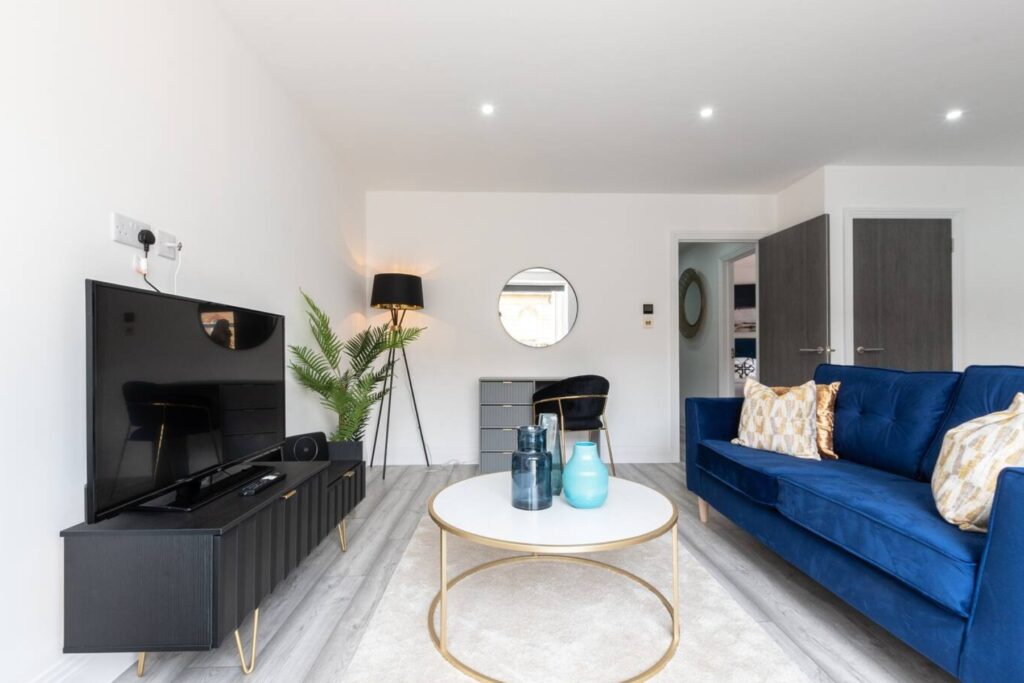
There are pros and cons to every investment.
Serviced apartments are no different.
Here are a few pros and cons of investing in serviced apartments:
Pros:
- Strong Rental Returns: Serviced apartments generally yield higher returns than traditional buy-to-let properties.
- Guaranteed Rental Income: Some property management companies offer guaranteed rental income, providing investors with financial security.
- Growing Demand: With the rise of business travel and tourism, the demand for serviced apartments is growing.
- Flexibility and Convenience: Serviced apartments offer guests more space and freedom than a hotel room, making them an attractive option.
Cons:
- Higher Initial Investment: Furnishing and equipping a serviced apartment to meet guest expectations can be expensive.
- Market Risk: Like any property investment, there’s a risk that market conditions could change. For example, a drop in tourism could impact occupancy rates.
- Management Challenges: Managing a serviced apartment can be time-consuming and stressful, especially if you’re handling bookings, maintenance, and guest services yourself.
- Regulatory Risks: Local laws and regulations around short-term rentals can change, potentially impacting your business.
Is planning permission required for serviced accommodation?
Depending on the view of the local council, you might need planning permission to change a residential or buy-to-let property into serviced accommodation.
It depends on whether the local council considers there’s been a ‘material change’ in use – from residential (C3) to something more like a hotel or guest house (C1).
But here are the main things you need to know:
- No Specific Planning Designation: Currently – there’s no specific planning designation for serviced accommodation. It falls somewhere between a buy-to-let and a hotel.
- Location Matters: While national guidelines are important, local planning policies can make or break your planning permission application. For example, if your property is in London and you allow it to be used for short-term letting for periods that add up to more than 90 nights in a year, you’ll need planning permission.
- New Use Class System: The UK government is introducing a use class system for short-term rentals. Keep an eye out for these changes because they could affect you.
- Minimum Let Days: Your property must be available to let for a minimum of 210 days per year and physically let for at least 105 days of the same year.
So, do you need planning permission?
It depends on local regulations and how you’re using the property. Always check with your local council to avoid any legal hiccups.
What is the ’90-Day Rule’ for serviced accommodation?
The ’90-Day Rule’ for serviced accommodation is pretty straightforward:
- The Basic Idea: The 90-Day Rule applies to properties in Greater London. It means you can only let out your property on a short-term basis for a maximum of 90 days per calendar year.
- Airbnb Implications: This rule is especially relevant if you’re planning to use platforms like Airbnb. Once you hit the 90-day limit – you can’t host any more short-term stays for the rest of the year.
- Why It Exists: The 90-day rule is designed to balance the need for short-term rentals with the availability of long-term housing for residents. It aims to prevent properties from being permanently used as short-term rentals.
- Breaking the Rule: If you exceed the 90-day limit without the necessary planning permission, you could face legal consequences. That’s why you need to keep a close eye on your bookings.
That’s the ’90-Day Rule’ in a nutshell.
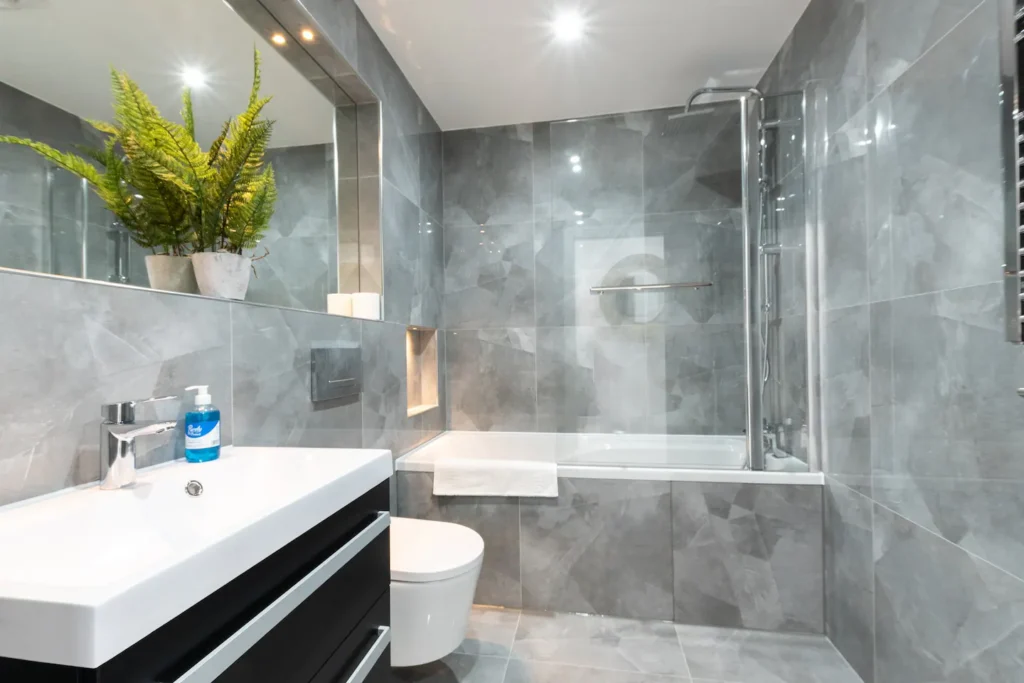
What type of mortgage do I need for serviced accommodation?
There are 3 types of mortgage you might need – depending on your situation:
- Serviced Accommodation Mortgage: This is a specific type of buy-to-let mortgage designed for properties rented out on short-term lets.
- Commercial Mortgage: A commercial mortgage is a type of loan secured against commercial property, like shops, offices, or industrial buildings. It’s usually for larger-scale operations and isn’t typically used for individual residential properties. However – serviced accommodation can be classed as commercial property.
- Holiday Let Mortgage: If your property is being used like a holiday rental – a holiday let mortgage could also be an appropriate option.
You can’t use a standard buy-to-let mortgage for your serviced accommodation business.
Can leasehold studios become serviced accommodation?
Yes – leasehold studios and apartments have the potential to transform into serviced accommodations if the lease terms permit short-term lets.
While most leasehold apartments allow for renting on an AST basis – it’s crucial to review the terms to determine if short-term lets are permitted.
Can you do rent-to-rent with serviced accommodation?
Yes – you can do rent-to-rent with serviced accommodation.
Here’s what you need to know:
- What is Rent-to-Rent? This is where you rent a property from a landlord and then sublet it to tenants. You’re the middleman – taking on the responsibility of managing the property and keeping it occupied.
- How Does Serviced Accommodation Fit In? When you get into serviced accommodation, you’re providing fully furnished properties for short-term or long-term stays. These are typically higher-end rentals that include services like cleaning, utilities, and even concierge.
- The Combo: When you combine rent-to-rent with serviced accommodation, you’re renting a property, furnishing it, offering services, and then renting it out on a short-term basis to others. This can potentially offer higher returns than traditional long-term rentals.
- Things to Keep in Mind: This strategy can be profitable but it comes with risks. You’re responsible for making sure the property is filled, and any vacancies can lose you money. You’ll also need permission from the original landlord to sublet the property as serviced accommodation.
What insurance do I need for serviced accommodation?
You need specialised serviced accommodation insurance that covers these things:
- Property Damage Cover: This is a must-have! It covers damage to the physical structure of the property, including the building, fixtures, and furnishings. You need to be prepared for any unexpected mishaps.
- Landlord Contents Insurance: This covers any items you own within the property. If you’re providing fully furnished accommodation – this is crucial.
- Public Liability Insurance: This protects you if a guest or a third party gets injured on your property and decides to sue.
- Buildings Cover: This is typically included in most policies and covers damage to the actual structure of the property.
- Home Emergency and Boiler Cover: Some insurers offer this as an add-on. It can be useful for covering emergency repairs.
- Accidental Damage Cover: This covers unintentional damage caused by guests.
- Legal and Tenancy Eviction Cover: This can cover legal expenses if you ever need to evict a tenant.
- Theft without forced entry: This covers theft that occurs without signs of breaking and entering, which can happen with short-term lets.
Remember – every insurance policy is different. They may not all offer these specific types of cover – that’s why it’s important to do your research or seek advice from an insurance broker to find the best solution for your situation.
The easy way to invest in serviced accommodation – and get guaranteed monthly returns
Managing service accommodation can be a lot of work and hassle.
The good news is:
When you invest with Unique Property Investments Group – we’ll take care of everything for you.
We’ll research the market and find the right property.
We’ll market and manage the property.
We’ll take care of all the renovations and legal stuff.
All you need to do is invest your money and we’ll send you payments every month.
The best part is:
When you invest with us – you’ll get guaranteed, fixed monthly payments for 3 years.
Through our partnerships with some of the country’s biggest organisations and government agencies – we can guarantee you an 18% return on your investment.
Click here to learn more about our serviced accommodation investment opportunity.
FAQs
Is serviced accommodation illegal?
No – serviced accommodation is not illegal. If you follow the rules.
Serviced Accommodation (SA) is a legal business model. With the right understanding of the business and the use of appropriate contractual agreements, it can be a legitimate enterprise.
What are the rules for serviced accommodation in England?
- Planning Designation: At the time of writing, there’s no specific planning designation for serviced accommodation. It falls somewhere between a buy-to-let and a hotel.
- 90-Day Rule: Some Local Authorities, especially in London, have a rule that prohibits properties from being let out for short term stays for more than 90 days in a calendar year.
- Fire Safety Regulations: All Serviced Accommodation must have a full-length, written fire risk assessment that covers all areas of the property.
- Furnished Holiday Lets (FHL) Criteria: Furnished serviced accommodation properties can be legally treated as Furnished Holiday Lets if they are let on a commercial basis for at least 210 days and actually let for at least 105 days in the year.
- Local Rules: Some local authorities, like Bournemouth Christchurch and Poole Council, have their own specific rules on serviced accommodation.
Is Airbnb serviced accommodation?
Here’s what you need to know:
- Airbnb: This is a platform where people can rent out their entire property or just a room in their home for short-term stays. It’s peer-to-peer, meaning you’re often dealing directly with the property owner.
- Serviced Accommodation: These are fully furnished properties that are maintained by professional management companies. They usually offer hotel-like amenities such as daily cleaning and laundry service.
Is Airbnb serviced accommodation? The answer is:
It can be, but it doesn’t have to be.
- Some Airbnb listings might meet the criteria of serviced accommodation – they’re fully furnished, professionally managed, and offer hotel-like amenities.
- However, not all Airbnb listings fall into this category. Many listings are private homes or rooms being rented out by their owners, without the added services and professional management that comes with serviced accommodation.
Bottom line: While there’s overlap between Airbnb and serviced accommodation, they’re not the same. The distinction is about the level of service and management provided.

